The BFO Team's Biggest Marketing Pet Peeves
May 08, 2024
7 Minute Read
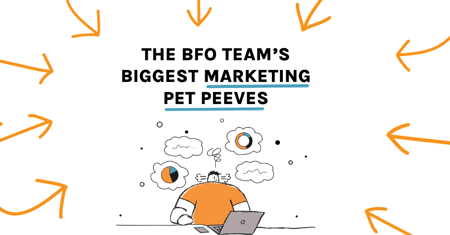
Ever cringed at an ad, rolled your eye at a tagline, or wanted to chuck your phone across the room after yet another pesky pop-up? Us too. As a team of marketers who have seen it all over the past few decades, today, we’re keeping things light and sharing our biggest marketing pet peeves!
We’ve all got ‘em—so let’s not sugarcoat it. Below we’re diving into the good, the bad, and the downright lazy when it comes to digital marketing.
Not Using Data to Drive Your Strategy: Maggie Sauer, Director of Strategic Partnerships
The term “data-driven” has become a buzzword in our industry that is often times as accurate as your local weather forecast. Everyone seems to be tracking their marketing data but no one seems to trust it, or really understand how to utilize the analytics platform they are using (cough cough GA4). But this pet peeve really comes down to two things: data integrity and properly analyzing your data to inform your marketing strategy.
- Data Integrity: is your data tracking accurate? If it's not, bite the bullet and hire someone to fix it. Collecting inaccurate data - especially if you’re using it to make important marketing decisions like determining your budget for a campaign- is like throwing money away. Trying to troubleshoot in-house is great if
 you have the skillset, but it takes a lot of time and dedication to stay current on proper platform configuration. So, if you don’t (and there is no shame in that) find someone who can. It will save you money in the long term and give you peace of mind. YOU NEED ACCURATE DATA TO MAKE INFORMED DECISIONS!
you have the skillset, but it takes a lot of time and dedication to stay current on proper platform configuration. So, if you don’t (and there is no shame in that) find someone who can. It will save you money in the long term and give you peace of mind. YOU NEED ACCURATE DATA TO MAKE INFORMED DECISIONS! - Analyzing Data for Your Strategy: Learn how to use the analytics platform you have chosen to track your marketing data and use it often. I can’t tell you how often I meet an overworked Marketing Director who hasn’t had time to learn GA4 and isn’t looking for patterns in their data that point to quick optimizations that can make a big impact. If you don’t have time to learn your platform, seek a partner to build you a custom report dashboard that makes these trends easy to spot.
- For most clients, I recommend a quarterly strategy refresh where they dive into their data to see what content is working, what pages aren’t getting the love they need, and how users are actually finding their brand. Learning how to properly analyze your data will give you a better understanding of your user journey and what actually works for your audience. This can make a massive impact in a world where every user seems to be ad blind and overwhelmed with content that isn’t helpful to them.
Keyword Stuffing: Jon Pappas, Director of Organic Search
Though it sounds like a fun Thanksgiving dish, keyword stuffing is another one of our top marketing pet peeves. This bad boy (literally) involves cramming excessive keywords into website content to try and manipulate search engine rankings. Aka, putting a bunch of unnecessary content into each website page or blog to rank higher on Google, Pinterest, etc.
website content to try and manipulate search engine rankings. Aka, putting a bunch of unnecessary content into each website page or blog to rank higher on Google, Pinterest, etc.
The problem with this? It not only undermines the user experience but also puts a big red X on your credibility and the quality of your online content. Sure, it may have worked for websites that chose this spammy tactic in the past, but search engines are much more sophisticated now. Many algorithms prioritize relevance, user intent, and overall content quality instead of just keyword density.
So instead of awkward content that’s not easy to read, try packing your website full of value instead. Google’s algorithms can detect keyword stuffing, so you’ll keep the head honcho of search engines happy while providing high-quality content for your audience to enjoy!
Sloppy Targeted Ads: Curtiss Gulash, Director of Paid Media
Another marketing pet peeve we’ve all experienced: seeing ads that have absolutely no relevance to us whatsoever. We’re talking cat litter for dog owners, luxury vacations for backpackers, and gas-guzzling trucks for eco-conscious folks. These days, personalization is everything, and sloppy targeting will get your brand nowhere!
gas-guzzling trucks for eco-conscious folks. These days, personalization is everything, and sloppy targeting will get your brand nowhere!
One of the most annoying things we see here is what we like to call a “retargeting fail.” This happens when users are bombarded with ads for products or services they’ve already purchased or are no longer interested in. Whether it’s a pair of shoes you bought or a destination you just got back from, these ads can feel both intrusive and irrelevant.
Bottom line: poorly targeted ads are only going to hurt your business. Instead, remind yourself that behind every screen is a user with unique needs and interests. And if you’re looking for more on targeting in this post-cookie world we’re living in, check out our breakdown here.
Lack of Mobile Optimization: Kyle Geib, Director of Marketing & Digital Communications
Let’s be real—trying to navigate a website that isn’t optimized for our mobile devices is frustrating. Most of the time, we end up bouncing after a few seconds if we can’t easily find what we need. That’s why lack of mobile optimization is another one of our marketing pet peeves.
marketing pet peeves.
Mobile devices account for more and more traffic every day, so ensuring your site is fully optimized for different users isn’t just optional—it’s essential. Yet, despite its benefits, we still find ourselves stuck on websites that won’t load or whose content we need to excessively scroll through (ain’t nobody got time for that).
In an age where attention spans are short and competition is fierce, the last thing you want is a website that pushes people away. Whether it's responsive design, fast load times, or intuitive navigation, investing in mobile optimization is a smart move for brands both big and small!
Ignoring Data Privacy: Jon Phillips, Director of Analytics
Brands who ignore data privacy. Though this may not have always been a top priority for businesses in the past, it definitely should be now. In today’s world, personal information is increasingly valuable, and concerns about online privacy are at an all-time high.
valuable, and concerns about online privacy are at an all-time high.
Even so, there are plenty of businesses that still choose to ignore (or worse, manipulate) user data for their marketing goals. From shady collection practices to blatant disregard for consent, ignoring data privacy does nothing but damage the trust between you and your audience.
Yes, we love data over here (like, a lot), but it should never come at the expense of a user’s privacy. You’ll not only violate their trust but break plenty of regulatory requirements such as the General Data Protection Regulation (GDPR) and the California Consumer Privacy Act (CCPA).
Moral of the story: Don’t prioritize short-term wins over long-term trust and integrity! Instead, embrace server-side tracking as an ethical way to stay ahead online.
Is Your Business Making These Mistakes?
Man, it feels good to get those off our chests! The world of marketing is packed with possibilities, but it’s certainly not without its quirks. To avoid being *that guy*, you’ll want to have a healthy dose of creativity and patience.
Need a little help delivering an outstanding marketing experience? That’s what we’re here for. Send us a message today so we can tackle this ever-changing marketing landscape together!
Stay up-to-date on the never-ending changes in digital marketing with our monthly newsletter:

Kyle Geib
As Director of Marketing and Digital Communications, Kyle brings an extra layer of enthusiasm to BFO’s incredible team of experts. Dedicated to continuing to cultivate BFO’s presence as a unique and knowledgeable voice in the industry, he leans in on his experience marketing in both the B2C and B2B spaces.
CATEGORIES
SUBSCRIBE TO OUR BLOG
Stay up to date with the latest industry best practices in digital marketing!
















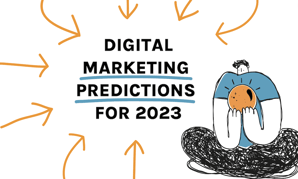
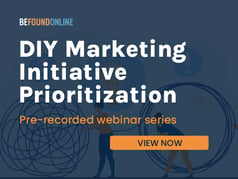





.png?width=339&height=179&name=Webinar%20Banner%20(1).png)



.png?width=339&height=179&name=July%20Webinar%20(Newsletter).png)
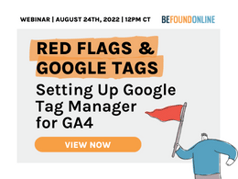
.png?width=339&height=179&name=Webinar%20Banner-April-02%20(1).png)
%20(4).png?width=339&height=179&name=Webinar%20Banner-May-02%20(1)%20(4).png)




.png?width=339&height=179&name=March%202023%20Webinar%20Ad%20(autoresponder).png)










.png?width=339&height=179&name=2025%20Paid%20Media%20(1200%20x%20628%20px).png)








































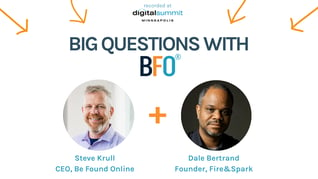
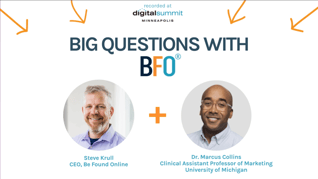











.png?width=339&height=179&name=2026%20Paid%20Media%20Ad%20Specs%20(Twitter%20Post).png)

